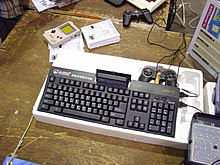|
Subor
Subor is the western brand name for a range of consoles and computer systems produced by Xiaobawang Company (also Xiǎo Bàwáng Company), based in Zhongshan, China. Xiaobawang Company is owned by Yihua Group. The consoles were very popular at the end of the 1980s and in the 90s. Later the company diversified to manufacturing other electronic devices.[1] HistoryCirca 1987, Nihwa Electronics Factory was a struggling arcade game manufacturer owned by Yihua Group.[2][3] It was headquartered in Xiqu Subdistrict, Zhongshan, Guangdong.[4] In 1989, Yihua Group appointed graduate Duan Yongping as director of the Nihwa Electronics Factory. Duan oversaw the development of the company's first console model, the D25. It was a famiclone (Famicom / NES clone) and was given the name Xiǎo Bàwáng (Chinese: 小霸王; lit. 'Little Conqueror').[5][6] The console sold at a much lower price than imported official Nintendo machines, and it became very popular.[2] In 1991, Nihwa Electronics Factory was renamed to Xiaobawang Company, known as Subor in the west.[7] As some parents were loath to buy devices for purely recreational reasons, in 1993 the consoles were called educational and the company produced versions with keyboard and educational software.[1][5][6] These models were based on combining the Taiwanese Laser-310 with a Famicom chip, and called Chinese English Learning Machine (Chinese: 中英文电脑学习机). The first model was the SB-218.  In 1993–4, improved models SB-286 and SB-486 were released.[2][5][8] Jackie Chan became a spokesperson for the company.[9]  In 1995, the SB-926 was released. However, Duan left the company in August. He was not satisfied with the financial setup of the company and the fact that the Yihua Group would not give him or other staff shares.[2][3] He went on to found BBK Electronics later in the same year. In 1998, the company's last famiclone, the SB-2000, was released. Although, still using 8-bit 6502 based system (CPU UM6561), it was upgraded with 512KB of RAM, separate keyboard, mouse and disk drive. It had revised software and included a similar terminal prompt similar to MS-DOS, F-BASIC and a mouse driven GUI.[10][11] The Xiaobawang Company was impacted by the ban on game consoles in China. The ban lasted from 2000 to 2015.[1] The company specialized in other electronic products such as dictionaries. In 2004, a number of subsidiaries were created; Xiaobawang Educational Electronics, Xiaobawang Digital Audio, Xiaobawang Electrical Appliances, and Xiaobawang Kitchen.[12] A new video game system, the Subor Z+ / Z+ New Gaming Computer, was unveiled in 2018.[6] Xiaobawang Company also invested money into virtual reality devices.[1] ImpactKaren Chiu stated in 2019 that Chinese people who played video games as children had nostalgia for the Xiǎo Bàwáng Video Game System comparable to such in Western countries for the actual consoles.[7] SubsidiariesSubor Culture DevelopmentAccording to Sixth Tone, Subor Culture Development was spun out of Yihua Group, in 2015, to develop virtual reality products.[13] Subor Culture Development went bankrupt in 2020 as per the Zhongshan Intermediate People's Court, and authorities barred Feng Baolun, the legal representative of the company, from commerce deemed "high consumption" including commercial air travel and staying in a hotel deemed to be upscale due to Feng being labeled a "discredited" person.[1] Sixth Tone said this was the only part of the company that is defunct and the Subor brand is still active.[13][6] References
|
||||||||||||||||||||||||||||
